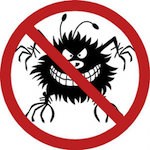In today’s desktop environment a couple things have become ubiquitous, your Operating System was probably touched in some way by Bill Gates and you will be effected by viruses. One recent study suggested that 99% of desktop users will or have had to deal with a virus in some form on their computer (assuming Windows is not a virus). For this reason we have many choices in mature, powerful virus scanners and detectors. In this article I’ll look at a few that I’ve come across and let you know the best I’ve seen so far.
Norton Anti-Virus 2003 ** My Pick **
Product WebSite
McAfee Anti-Virus 4.5.1
Product WebSite
Command Software Anti-Virus
Product WebSite
Norton Anti-Virus 2003
Symantec boasts one of the strongest research labs on the Internet. The routinely release small patches for infections and their virus reports are second to none. It seems Symantec revolves around this superior virus research data. For this reason, you’re likely to have great protection with the Symantec Virus scanner.
The flagship anti-virus package is something of a paradox really. It is best suited for the consumer market being on many of the free disks you get from AOL, etc. in addition, this product can be found on all of Symantec’s other standard issues products (Navigator, SystemWorks, Internet Security, etc.).. The prevalence of the product is great, giving it the impression of free-ness.
The problems come in the marketing strategy. The product itself can be used for free – but you only get one year of DAT updates using their standard LiveUpdate utility. In my mind, this is not acceptable and is generally a lame marketing ploy. This might be offset by the fact that Symantec actually releases a new version of the virus scanner once a year.
Another peeve I have about this software is the complexity of rolling out the package in a corporate environment. The LiveUpdate utility needs to be used and the configuration files actually need to be compiled by an administration application to be used by the client computers. I have not seen the newest offering of this and it may have improved from the last time.
Two of the nicest improvements of Norton Anti-Virus 2003 are the improvements in scanning and reporting of viruses and stability. Found viruses are reported by way of a small window much like that of McAfee making the action much more un-cumbersome. While scanning in the background, email messages are actually looked at independent of mail package. The stability of the Anti-Virus package is actually the best I’ve seen of all packages so far. The application does not crash or so much as hiccup when through restarts, stand-bys and even Hibernation.
McAfee Anti-Virus 4.5.1
For some time this has been my pick for best anti-virus. McAfee has done a great job with their corporate product offering. The retail version leaves a little to be desired though. The retail version can receive updates from Macfee for free (indefinitely) as long as you use the product but you are inundated with reminder messages about registration and purchase of the product.
The corporate version, on the other hand, does not display such messages and is actually quite configurable in terms of DAT updates and network centralization. The real-time scanner can be configured to clean, erase or report on viruses found and does not get in your way when a virus does come up. Macfee’s NetSheild product is also very well behaved on NT servers and even works quite well on Windows NT (if not for a few bugs that pop up).
When it comes to mobile computer and more specifically, stabilty, this product has serious issues. There are a number of interoperability issues with Windows NT 4.0, Interactions with DOS-Based applications are a problem and the application cannot handle power-mode operations (stand-by, hibernation) without crashing. Compatability also seems to be an issue since on the web-site the application is expressed as supporting Windows XP (MultiPlatform Version), but the installed or readme files hold no references to Windows XP.
Command Anti-Virus
At the bottom of my list is an application that formed from the people that brought us F-Prot. This application is Windows based and has features such as real-time scanning, auto-update of virus signatures and scanning of drives while the computer is in idle mode.
One of the biggest troubles with this application is it’s inability to catch a virus and clean it. Recently a client of mine running this package had a popular virus derivative and was not able to clan the computer completely. The system had to be manually cleaned. This virus was a very cleanable VBS (Visual Basic Script) macro virus.
The AutoUpdate feature works in it’s basic form, but the setup and configuration is very cryptic and messages leave much too much to the imagination. The corporate side of the application provides and enterprise administrator to handle the auto download of files – and leaves your system/server with as much as 500mb of drive space used up.
In the end, this application has the potential to compete with the big boys, but lacks many of the slick features that might give it an edge.
There are certainly more products out there and as I come across new ones every day, I will relay my thoughts to you about them. If there is something you’ve seen and liked or a product you think I should look at, get back to me.
My criteria for evaluation of these applications are based on cost, usability, ease of updates and over all ability of the application to detect and deal with viruses.
